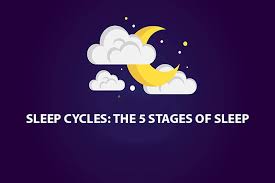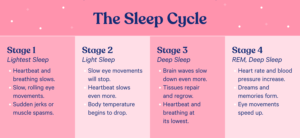There are five different sleep stages that a person goes through during sleep: Stage 1, Stage 2, Stage 3, Stage 4, and REM sleep. Each stage has its own distinct characteristics. let’s learn about these sleep stages.
Contents
- 1 Meaning Of Sleep Stages?
- 2 Circadian Rythm And Sleep
- 3 Five Different Sleep Stages
- 4 Characteristics Of Each Sleep Stages
- 5 Types Of Sleep
- 6 How Each Stage Affects The Body?
- 7 How Do You Get a Good Night’s Sleep?
- 7.1 Go to bed and wake up at the same time every day
- 7.2 Avoid caffeine and eating heavy meals before bed
- 7.3 Make sure your bedroom is dark, quiet, and cool
- 7.4 Follow a routine before bedtime
- 7.5 Get regular exercise
- 7.6 Reduce stress in your life
- 7.7 Get plenty of sleep during the day
- 7.8 Avoid watching TV in bed
- 7.9 Stick to a bedtime routine
- 8 Conclusion
- 9 A Word From Therapy Mantra
Meaning Of Sleep Stages?

The brain’s natural daily rhythms are governed by structures in the brain that control when you fall asleep and wake up. Sleep progresses through a series of distinct physiological stages. Each stage of sleep serves an essential function in maintaining your brain and body healthy. During the night, periods of quiet slumber alternate with times of REM (dreaming) sleep. Quiet sleep is crucial since it aids in the repair of the body, while REM sleep is important for learning and memory because it restores the mind.
The different sleep stages that occur during a night’s sleep are important for our overall health and well-being. Each stage serves a specific purpose in our overall sleep cycle. The three main sleep stages are Stage 1, Stage 2, and Stage 3.
Circadian Rythm And Sleep
The body’s natural daily rhythms are governed by structures in the brain that control when we fall asleep and wake up. Sleep progresses through a series of distinct physiological stages, and each stage of sleep serves an essential function in maintaining your brain and body healthy. During the night, periods of quiet slumber alternate with times of REM (dreaming) sleep. Quiet sleep is crucial since it aids in the repair of the body, while REM sleep is important for learning and memory because it restores the mind.
Five Different Sleep Stages

There are five different sleep stages that a person goes through during a night’s sleep: stage 1, stage 2, stage 3, stage 4, and REM sleep. Each stage is associated with different brainwave patterns, and each stage serves a unique purpose.
Sleep Stage 1
Stage 1 is the lightest stage of sleep, and it is during this stage that a person is most likely to wake up. This stage is characterized by slow brainwave activity, and it usually lasts for only a few minutes. Stage 1 is the lightest stage of sleep, and it usually lasts for 5-10 minutes. During this stage, we usually drift in and out of sleep and may experience sudden muscle contractions.
Sleep Stage 2
Stage 2 is the second stage of sleep, and it is during this stage that a person’s brainwave activity begins to slow down. This stage usually lasts for about 20 minutes, and it is during this stage that a person’s body temperature begins to drop. Stage 2 is a deeper stage of sleep, and it usually lasts for 20-30 minutes. This is when most of our restorative sleep occurs.
Sleep Stage 3
Stage 3 is the third stage of sleep, and it is during this stage that a person’s brainwave activity slows down even more. This stage usually lasts for about 30 minutes, and it is during this stage that a person’s heart rate and breathing begin to slow down. Stage 3 is the deepest stage of sleep. This is when our body repairs and regenerates tissues, builds bone and muscle and strengthens the immune system. Stage 3 is also important for memory consolidation, as information learned during the day is consolidated into long-term memories.
Sleep Stage 4
Stage 4 is the fourth stage of sleep, and it is during this stage that a person’s brainwave activity slows to its lowest point. This stage usually lasts for about 20 minutes, and it is during this stage that a person is most likely to experience nightmares.
REM Sleep
REM sleep is the fifth stage of sleep, and it is during this stage that a person’s eyes move rapidly back and forth. This stage usually lasts for about 20 minutes, and it is during this stage that a person’s brainwave activity increases dramatically. REM sleep is thought to be important for consolidating memories and learning new information.
Characteristics Of Each Sleep Stages

During the different sleep stages, our brain waves and muscle activity vary. Each stage has its own unique set of characteristics.
Stage 1 is a light sleep stage that occurs as we drift off to sleep. Our brain waves are slow and there is minimal muscle activity. This stage typically lasts for 5-10 minutes.
Stage 2 is a more deep sleep stage. Our brain waves are slower and more synchronized, and our muscles are relaxed. This stage typically lasts for 20-30 minutes.
Stage 3 is the deepest sleep stage. Our brain waves are slow and high- amplitude, and our muscles are relaxed. This stage typically lasts for 30-45 minutes.
Stage 4 is the final stage of sleep. Our brain waves are slow and high- amplitude, and our muscles are relaxed. This stage typically lasts for 1-2 hours.
After Stage 4, we enter into a state of Rapid Eye Movement (REM) sleep. In REM sleep, our brain waves are fast and low- amplitude, and our eyes move quickly from side to side. This stage typically lasts for 20-30 minutes. REM sleep is the final stage of sleep and is characterized by rapid eye movements and a high level of brain activity. This stage typically lasts for around 20 minutes.
Each sleep stage serves a unique purpose in helping us rest and rejuvenate. It’s important to get the right amount of each stage for optimal health. Sleep is an important aspect of our lives, and it is during the different stages of sleep that our bodies repair, regenerate and rejuvenate. By understanding the different stages of sleep, we can ensure that we are getting the most out of our slumber. So make sure you get your seven to eight hours every night!
Types Of Sleep

There are two main types of sleep:
- REM (rapid eye movement)
- Non-REM (non-rapid-eye movement).
REM (rapid eye movement)
REM sleep is characterized by the rapid movement of the eyes, as well as dreaming. This type of sleep is considered to be the most restful. REM sleep usually occurs after a person has gone through all four stages of non-REM sleep. REM sleep is when most dreaming occurs and it is also considered to be the most restful type of sleep.
Non-REM sleep
Non-REM sleep is the first of the four sleep stages. It is also the deepest stage of sleep. During this stage, your body repairs and regenerates tissues builds bone and muscle, and strengthens your immune system. Non-REM sleep is also when your brain consolidates memories.
Non-REM sleep is divided into four stages, with each stage featuring different characteristics.
Stage 1 is the lightest stage of sleep and is usually brief. Stage 2 features a deeper sleep, while Stage 3 is when the body begins to produce delta waves, which are associated with deep sleep. The final stage of non-REM sleep, Stage 4, is the deepest stage.
The sleep stages cycle through each other several times during a typical night’s sleep. Most people will spend more time in Stages 2 and 3 than in the other stages.
How Each Stage Affects The Body?

Stage 1 usually lasts for only a few minutes and is not considered very restful.
Stage 2 is more restful than Stage 1 and is when the body begins to prepare for REM sleep.
Stage 3 is the deepest stage of non-REM sleep and is the most restful stage overall.
Stage 4 is the deepest stage of sleep and typically lasts for about 30 minutes.
REM sleep is not as restful as non-REM sleep, but it is important for maintaining mental and emotional health.
The different stages of sleep have different effects on the body. Knowing what happens in each stage can help people get a better night’s sleep.
How Do You Get a Good Night’s Sleep?
To get a good night’s sleep, you need to go through all four stages of sleep. You can do this by going to bed at the same time every night and waking up at the same time every morning. You should also avoid drinking caffeine and eating heavy meals before bed. And lastly, make sure your bedroom is dark, quiet, and cool.
Now that you know about the different sleep stages, you can take steps to get a good night’s sleep. Follow these tips and you’ll be well on your way to getting the rest you need.
1. Go to bed at the same time every night and wake up at the same time every morning
2. Avoid drinking caffeine and eating heavy meals before bed.
3. Make sure your bedroom is dark, quiet, and cool.
4. Follow a routine before bedtime.
5. Get regular exercise.
6. Reduce stress in your life.
7. Practice relaxation techniques before bedtime.
8. Get plenty of sleep during the day.
9. Avoid watching TV or using electronic devices in bed.
10. Establish a bedtime routine and stick to it!
Go to bed and wake up at the same time every day

One of the best ways to ensure you get a good night’s sleep is to go to bed at the same time every night and wake up at the same time every morning. This will help your body establish a regular sleep pattern.
Avoid caffeine and eating heavy meals before bed
Eating a heavy meal before bed can make it difficult to fall asleep. And drinking caffeine can keep you awake long into the night. Try to avoid eating and drinking anything that contains caffeine in the hours leading up to bedtime.
Make sure your bedroom is dark, quiet, and cool
To get a good night’s sleep, you need a dark, quiet, and cool environment. Make sure your bedroom is free of distractions and that the temperature is comfortable.
Follow a routine before bedtime
It can be helpful to establish a routine before bedtime. This will help your body relax and prepare for sleep. Some things you may want to do before bed include reading, stretching, or taking a bath.
Get regular exercise

Exercise is an important part of a healthy lifestyle. And it’s also beneficial for sleep. Regular exercise can help you fall asleep faster and improve the quality of your sleep.
Reduce stress in your life
Stress can keep you up at night and make it difficult to get the rest you need. If you’re feeling stressed out, try to find ways to relax before bedtime. Some relaxation techniques include deep breathing, visualization, and yoga.
Get plenty of sleep during the day
If you’re not getting enough sleep during the day, you’re going to have a harder time falling asleep at night. Make sure you get plenty of quality sleep every day to help improve your sleep at night.
Avoid watching TV in bed
Watching TV or using electronic devices in bed can make it difficult to fall asleep. Try to avoid using these things in the hours leading up to bedtime.
Stick to a bedtime routine
A bedtime routine can be helpful for getting a good night’s sleep. A routine may include things like reading, stretching, or taking a bath. Stick to this routine every night and you’ll be more likely to get the sleep you need.
There are many things you can do to get a good night’s sleep. Follow these tips and you’ll be on your way to getting the rest you need.
Conclusion
Sleep is an important part of our lives, but getting enough quality sleep can be challenging. The challenge often starts with understanding what triggers your body’s natural sleeping patterns and how to make the most out of each stage. We hope that by reading this article you have gained a better understanding of the different stages of sleep and now feel more confident in achieving optimal restfulness night after night. So get ready for bed! It’s time for some dreaming, deep REM sleep – like we discussed earlier in this blog post.
A Word From Therapy Mantra
Your mental health — Your psychological, emotional, and social well-being — has an impact on every aspect of your life. Positive mental health essentially allows you to effectively deal with life’s everyday challenges.
At Therapy Mantra, we have a team of therapists who provide affordable online therapy to assist you with issues such as depression, anxiety, stress, workplace Issues, addiction, relationship, OCD, LGBTQ, and PTSD. You can book a free therapy or download our free Android or iOS app.


